"You're getting stuff the New York Times never will," Al Rockoff says, pointing to a series of framed images before him. "That's the truth."
The stuff is extraordinary: A single human hand being carried away by stretcher from the scene of a rocket attack.
The blackened, decomposing corpse of an AP photographer killed by Khmer Rouge troops.
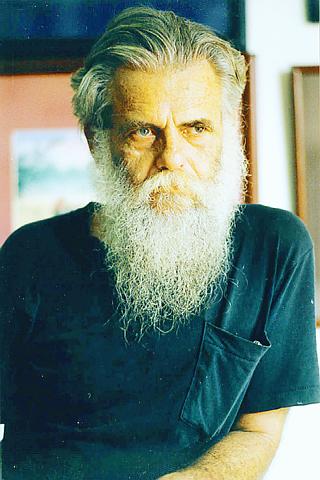
PHOTO: STEVEN O'CONNELL
A line of US Marines bracing against the wind kicked up by helicopter rotors during the American evacuation from Phnom Penh. For almost a decade, beginning as a US Army combat photographer in what he refers to as "the American war" in Vietnam followed by a stint as a freelance photographer from 1973-1975 capturing the brutal insanity of the Cambodian conflict and the eventual triumph of the Khmer Rouge, Rockoff gained a reputation for unforgettably macabre images he sold to Newsweek, AP, UPI, and the New York Times.
It was a brilliant career prematurely aborted by what he describes as a media "blacklist" against the use of his work following Rockoff's evacuation from the compound of Phnom Penh's French Embassy, along with the last remnants of the city's expatriate population, on May 7, 1975.
"I've been stiffed and ostracized," the bearded 52-year-old who was portrayed by the actor John Malkovich in Roland Joffe's film The Killing Fields says bitterly. "It's payback time."
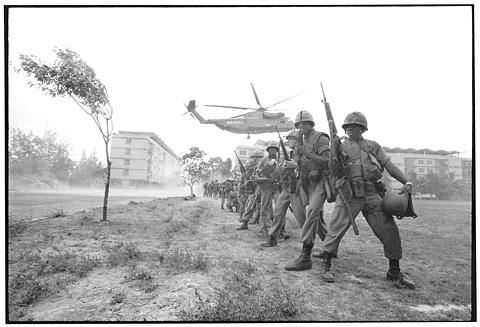
Payback, for Rockoff, is a special exhibition of his work in Phnom Penh to commemorate the 25th anniversary of the fall of the city to the Khmer Rouge on April 17, 1975.
It's an exhibition that Rockoff, out of all the photojournalists who covered the Indochinese conflict, is uniquely qualified to give.
"I shed blood for my art," he says of his passion for combat photography that led him to be wounded nine times and left him with the same unsettling thousand yard stare discernible in many of his subjects.
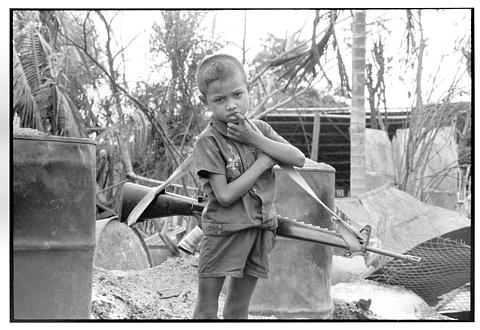
But it was Rockoff's coverage of the fall of Phnom Penh that was the pinnacle of a career he describes as "creative endeavor with an adrenaline rush."
As the Khmer Rouge entered Phnom Penh on April 17, 1975, beginning the systematic murder of military and government officials of the defeated Lon Nol regime and the evacuation of the general population to the Cambodian countryside, Rockoff roamed the city snapping incomparable photos of a society in its death throes.
"When the Khmer Rouge entered Phnom Penh people lined up along the sides of the street waving, while loudspeakers announced `the war is over , do not resist,'" he recalled.
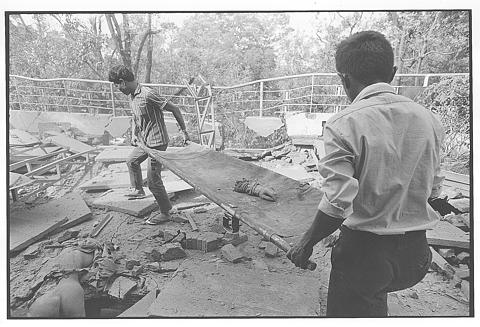
"People though the worst was over ... little did they know it had just begun."
Rockoff had an eerie first hint of the harsh reality of Cambodia's new order later that afternoon, when along with New York Times correspondent Sidney Schanberg and Cambodian interpreter Dith Pran he was detained by Khmer Rouge troops on the Japanese Bridge in central Phnom Penh.
"A Khmer Rouge soldier opened up Schanberg's travel bag and found his US$10,000 of `emergency money' and some underwear," he explained. "The soldier fanned through all the notes carefully, then took the underwear, leaving the money in the bag for Schan-berg."
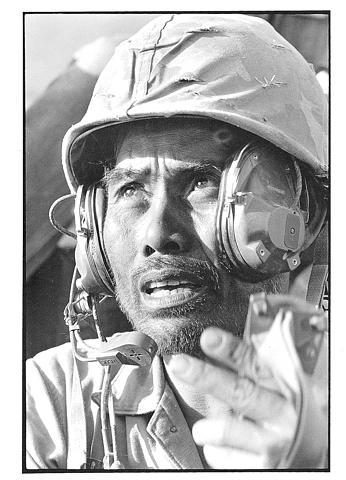
The symbolism of the soldier's disdain for money did not escape Rockoff -- in the pure, hard flame of the Khmer Rouge revolution, money was a fetish of the old society that was coming to an end. Rockoff becomes visibly angry at the mention of Schanberg, whom he accuses of deliberately and maliciously sabotaging his career.
"Schanberg left on the first convoy out of the French Embassy and asked me for the rolls of film that I'd shot," Rockoff said heatedly.
"When I told him that I was on day rate for Newsweek and that he could only have the pictures they didn't want he said `See if the New York Times ever runs any of your stuff again.'"
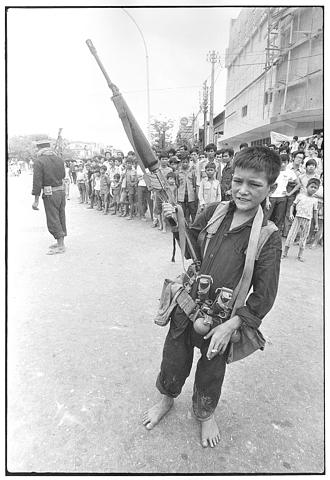
In the end Newsweek only ran three of Rockoff's photos, and upon his return to the US he was relegated to the journalistic margins, the vast majority of his work unseen.
Insult was added to injury following the release of the movie The Killing Fields, which Rockoff insists is full of "slanderous" misrepresentations of the historical record.
Rockoff remains incensed by the movie's representation of Schanberg as a concerned, sensitive individual who agonized over the fate of his Cambodian interpreter, Dith Pran.
"Schanberg is a coward who put other people's lives in danger," Rockoff barked angrily. "He used and abused Dith Pran and personally tried to have me thrown out of the safety of the French Embassy in April 1975."
Rockoff is most aggrieved at one of the scenes most emotional moments: when a photograph that Malkovich as Rockoff has taken of Dith Pran for a false passport is spoiled by a chemical reaction.
According to Rockoff and others who were present, the scene is completely fictional.
"It never happened," Rockoff said. "That movie blames and slanders me."
Through his exhibition and a planned book of photographs documenting the Cambodian conflict and its post-Khmer Rouge reconstruction, Rockoff hopes to correct what he feels are equally serious public misconceptions about the destruction of Cambodia he chronicled in the 1970s.
"A lot of people don't even remember what the war [in Cambodia] was all about, and specifically the role of the [1970] American invasion in what eventually happened here," he said grimly. "The blood debt that America owes Cambodia is a big one."

A magnitude 7.0 earthquake struck off Yilan at 11:05pm yesterday, the Central Weather Administration (CWA) said. The epicenter was located at sea, about 32.3km east of Yilan County Hall, at a depth of 72.8km, CWA data showed There were no immediate reports of damage. The intensity of the quake, which gauges the actual effect of a seismic event, measured 4 in Yilan County area on Taiwan’s seven-tier intensity scale, the data showed. It measured 4 in other parts of eastern, northern and central Taiwan as well as Tainan, and 3 in Kaohsiung and Pingtung County, and 2 in Lienchiang and Penghu counties and 1

FOREIGN INTERFERENCE: Beijing would likely intensify public opinion warfare in next year’s local elections to prevent Lai from getting re-elected, the ‘Yomiuri Shimbun’ said Internal documents from a Chinese artificial intelligence (AI) company indicated that China has been using the technology to intervene in foreign elections, including propaganda targeting Taiwan’s local elections next year and presidential elections in 2028, a Japanese newspaper reported yesterday. The Institute of National Security of Vanderbilt University obtained nearly 400 pages of documents from GoLaxy, a company with ties to the Chinese government, and found evidence that it had apparently deployed sophisticated, AI-driven propaganda campaigns in Hong Kong and Taiwan to shape public opinion, the Yomiuri Shimbun reported. GoLaxy provides insights, situation analysis and public opinion-shaping technology by conducting network surveillance

‘POLITICAL GAME’: DPP lawmakers said the motion would not meet the legislative threshold needed, and accused the KMT and the TPP of trivializing the Constitution The Legislative Yuan yesterday approved a motion to initiate impeachment proceedings against President William Lai (賴清德), saying he had undermined Taiwan’s constitutional order and democracy. The motion was approved 61-50 by lawmakers from the main opposition Chinese Nationalist Party (KMT) and the smaller Taiwan People’s Party (TPP), who together hold a legislative majority. Under the motion, a roll call vote for impeachment would be held on May 19 next year, after various hearings are held and Lai is given the chance to defend himself. The move came after Lai on Monday last week did not promulgate an amendment passed by the legislature that

Taiwan is gearing up to celebrate the New Year at events across the country, headlined by the annual countdown and Taipei 101 fireworks display at midnight. Many of the events are to be livesteamed online. See below for lineups and links: Taipei Taipei’s New Year’s Party 2026 is to begin at 7pm and run until 1am, with the theme “Sailing to the Future.” South Korean girl group KARA is headlining the concert at Taipei City Hall Plaza, with additional performances by Amber An (安心亞), Nick Chou (周湯豪), hip-hop trio Nine One One (玖壹壹), Bii (畢書盡), girl group Genblue (幻藍小熊) and more. The festivities are to